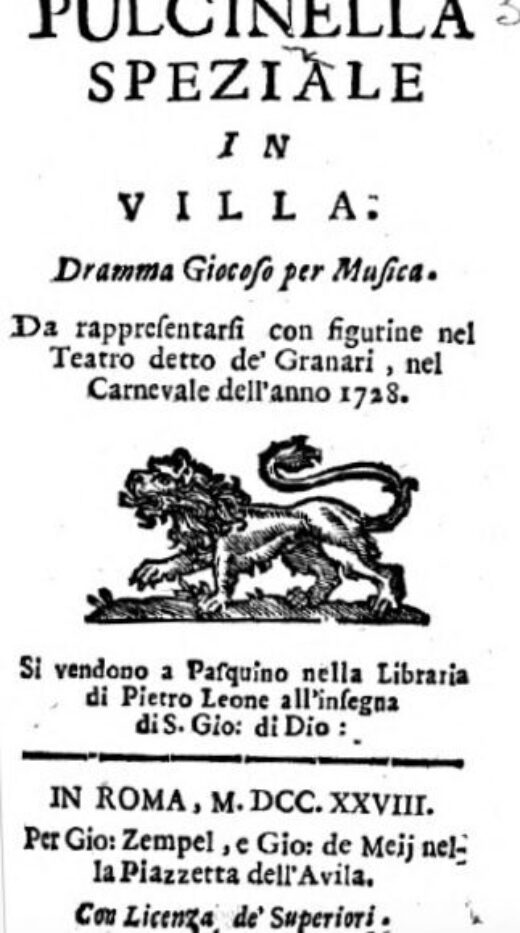
Printed
60 pages
Pulcinella speziale in villa
In the 17th and 18th centuries in Rome, the festivities of the Carnival often included puppet plays, many of which were set on the piazza Navona, or in its immediate vicinity. Some of these, meant for a popular audience, were staged outside or in temporary boxes; but aristocratic houses could accommodate, on miniature stages, sung performances using string or rod puppets. This was the case for instance of the Teatro de’ Granari, owned by the Pamphili family; most notably, Pulcinella speziale in villa (Pulcinella apothecary in the villa) and Pulcinella guardiano de' pazzarelli (Pulcinella keeper of the insane) were performed on this stage.
Pulcinella speziale in villa is an anonymous play built on the model of Lo Speziale di villa, a melodramma by Giovanni Cosimo Villifranchi, staged in 1683 on music by Giovanni Maria Pagliardi, then in 1719 at the Teatro del Cocomero in Florence, and republished several times during the first third of the 18th century. Pulcinella speziale in villa reworks it, dividing it into three acts. The libretto bears the words “dramma giocoso per musica, da rappresentarsi con figurine” (happy drama in music, to be performed with figurines). It seems to have been accompanied with music by Luca Antonio Predieri: as in other drammi per musica for puppets, which were fashionable at the end of the 17th century and at the beginning of the 18th, singers performed behind the stage while puppets were manipulated on it.
The characters shown alongside Pulcinella are typical of the commedia dell’arte: Cannetella, described as a Neapolitan woman, speaks her local dialect, just like her master. Contrasting this couple, Delmira speaks the formal language of lofty comedies; however, her cross-dressing leads to a series of comical misunderstandings as it attracts Cannetella’s love. Rosaura’s osculation scenes also lead to a series of misunderstandings and to double meanings typical of baroque comedy.
A young woman is lovesick
Pulcinella, an apothecary, is pleased with his situation. Her daughter’s servant, Cannetella, tells him that women have qualities that make good apothecaries. After quarrelling several times about this topic, Pulcinella plans on marrying her. However, Cannatella is in love with a young man, Lisardo, who came to offer his services and work in the shop. Lisardo was hired by Pulcinella and is happy to be progressing with his plans: in fact, under the name Lisardo, a young woman called Delmira is hiding. She came to take revenge on Filarco, who robbed her of her honour and then abandoned her. However, Filarco is now wooing Rosaura, Pulcinella’s daughter. In fact, Rosaura is sick: to cure her, Pulcinella suggests that she marry Damone; she flatly refuses. Filarco sees many similarities between Lisardo and his ex-mistress, whom he believed was dead, but he is still fooled: he asks the young man to help him win Rosaura; Delmira calls him a traitor.
To cure Rosaura, Pulcinella hires Damone, who is also a doctor: when the latter woos her during the consultation, she faints. As for Lisardo, he rejects Cannetella’s advances. The servant suggests that Filarco pretends to be a doctor to grow closer to Rosaura: because of her exhortations, Pulcinella summons Damone and Filarco, who examine the young woman together: this leads to double meanings between the young characters, who declare their love to each other. Filarco’s prescription is in fact a love letter, and Lisardo condemns his betrayal (Pulcinella cannot read): however, Rosaura manages to interpret every single word in medical terms.
After taking the treatment prescribed by Damone, Rosaura pretends to have gone insane and behaves like Eurydice waiting for her Orfeo (Orpheus). She is so believable that Pulcinella discharges Damone and relies on Filarco: Rosaura pretends to see Orfeo in him; he goes along with it and earns the right to marry her. In an attempt to stop the marriage, Damone discloses that Rosaura is not Pulcinella’s daughter. Therefore, Pulcinella does not have the right to decide who she will marry: Rosaura declares her love to Filarco nonetheless. Delmira reveals who she truly is, and Filarco decides to go back to his first wife. Rosaura then lets herself be talked into marrying Damone, and Cannetella agrees to marry Pulcinella.
First performance
Teatro de'Granari, during the Carnival
Publications and translations
Pulcinella speziale in villa. Roma: Giovanni Zempei et Giovanni de Meij, 1728.